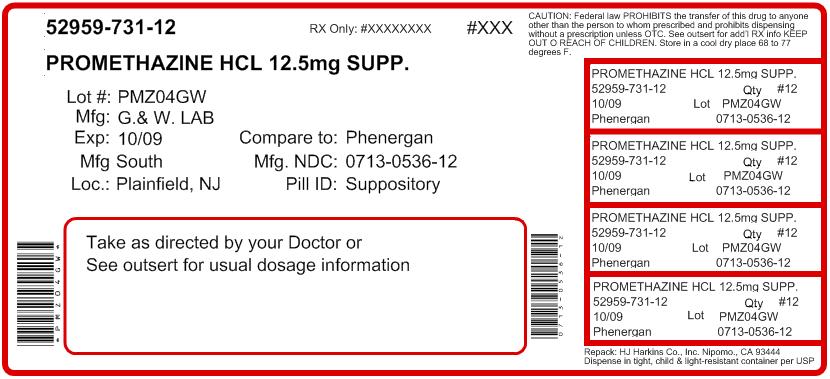
Promethegan | Promethazine Hydrochloride Suppository while Breastfeeding
What is Promethegan | Promethazine Hydrochloride Suppository used for?
Is using Promethegan | Promethazine Hydrochloride Suppository unsafe in breastfeeding? Can there be bad consequences for baby if I use it while breastfeeding?

Promethegan | Promethazine Hydrochloride Suppository Breastfeeding Analsys
Promethazine hydrochloride while Breastfeeding
Low RiskCAS Number: 60-87-7
1st-generation-antihistamine and phenothiazine-type drug with a strong sedative effect. At latest update relevant published data on excretion into breast milk were not found. It may decrease prolactin levels and interfere with milk production during the first few weeks after birth (Pontiroli 1981, Messinis 1985).Pharmacokinetic data (high volume of distribution and high plasma protein-binding capacity) would render it unlikely a significant passage into the breastmilk.In addition, a low oral bioavailability would hinder a further passage to infant’s plasma through the ingested breastmilk, except on premature infants and immediate neonatal period when there may be an increased intestinal permeability.There are doubts about any association with Sudden Infant Death Syndrome (SIDS) (Kahn 1982, Stanton 1983). It may be considered compatible with breastfeeding on isolated doses such as those used for pre-surgical medication or traveler's dizziness (WHO 2002). Avoid a repeated use as it may cause drowsiness in the infant.Avoid using it in the immediate neonatal period (first 4 to 6 weeks after birth) and in case of prematurity. If used, follow-up the infant for drowsiness and feeding issues. It is not recommended bed-sharing when taking this medication (UNICEF 2006, ABM 2008, Landa 2012, UNICEF 2013).
Promethegan | Promethazine Hydrochloride Suppository Breastfeeding Analsys - 2
Promethazine hydrochloride while Breastfeeding
CAS Number: 60-87-7
Based on minimal excretion of other phenothiazine derivatives, it appears that occasional short-term use of promethazine for the treatment of nausea and vomiting poses little risk to the breastfed infant. With repeated doses, observe infants for excess sedation. Because promethazine can lower basal prolactin secretion, promethazine might interfere with the establishment of lactation if given during labor, before lactation is well established or with a sympathomimetic such as pseudoephedrine. An antiemetic without potent histamine blocking action is preferred in nursing mothers.
What should I do if I am breastfeeding mother and I am already exposed to Promethegan | Promethazine Hydrochloride Suppository?
During whole lactation period you shall first discuss with your doctor and then together you shall decide whether you shall take that drug or not however if you have already taken Promethegan | Promethazine Hydrochloride Suppository then you shall inform your doctor, But you should not be worried too much as Promethegan | Promethazine Hydrochloride Suppository comes in category of low risk drug.
My health care provider has asked me to use Promethegan | Promethazine Hydrochloride Suppository, what to do?
Though Promethegan | Promethazine Hydrochloride Suppository dose not comes in category of safe drugs rather it comes in category of low risk but if your doctor is aware that you are breastfeeding your baby and has still recommended it then its advantages must be outweighing the risks.
If I am using Promethegan | Promethazine Hydrochloride Suppository, will my baby need extra monitoring?
Not much
Who can I talk to if I have questions about usage of Promethegan | Promethazine Hydrochloride Suppository in breastfeeding?
US
National Womens Health and Breastfeeding Helpline: 800-994-9662 (TDD 888-220-5446) 9 a.m. and 6 p.m. ET, Monday through Friday
UK
National Breastfeeding Helpline: 0300-100-0212 9.30am to 9.30pm, daily
Association of Breastfeeding Mothers: 0300-330-5453
La Leche League: 0345-120-2918
The Breastfeeding Network supporter line in Bengali and Sylheti: 0300-456-2421
National Childbirth Trust (NCT): 0300-330-0700
Australia
National Breastfeeding Helpline: 1800-686-268 24 hours a day, 7 days a week
Canada
Telehealth Ontario for breastfeeding: 1-866-797-0000 24 hours a day, 7 days a week
